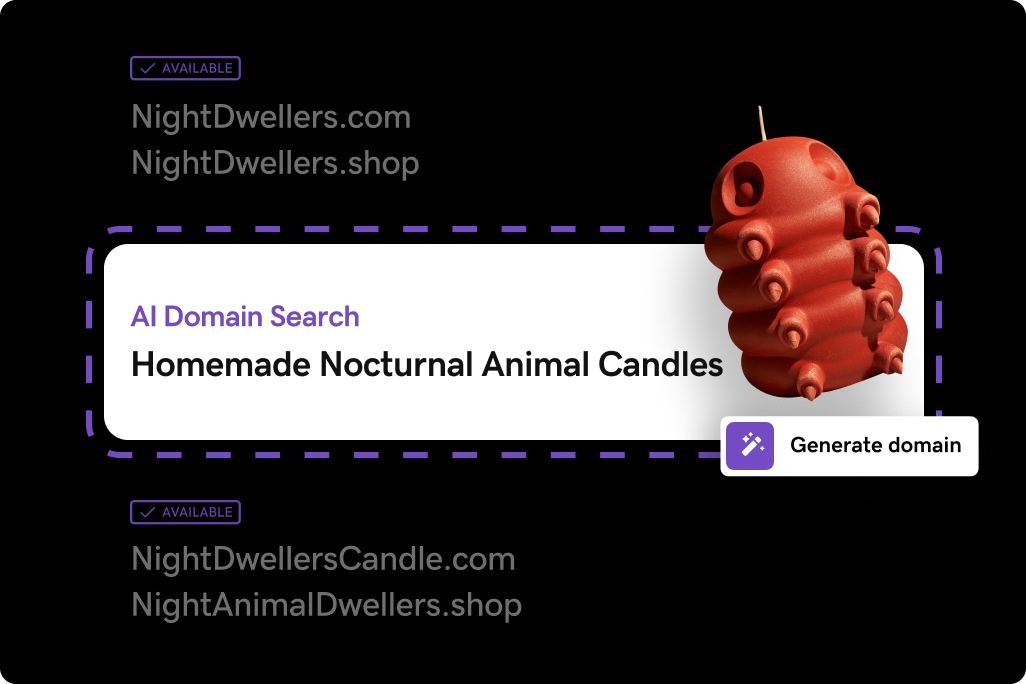Key takeaways
- Domain extensions provide branding opportunities beyond just .com. There are now nearly 1,600 top-level domains available, including generic TLDs (gTLDs) like .shop, .pizza, .vip as well as geographic extensions like .nyc, .vegas that allow you to tie your domain to a specific location or industry.
- Using descriptive new domain extensions can increase customer engagement by making your website's purpose clear at a glance. For example, a jewelry store could use .jewelry or a coffee shop could use .coffee.
- If your desired domain extension doesn't exist yet, you can pre-register or follow domains you're interested in, as new extensions are still being released regularly. In the meantime, opt for a currently available extension that is as close as possible to what you want.
Whether it’s for a business or blog, or you just want your own slice of the internet, your domain is your digital address online. If your domain is your address, your domain extension is like your ZIP code in that it gives your website visitors a little more information about you.
In the beginning of the internet age, domain extensions were extremely limited. As Make Use Of tells it, “In 1984, the Internet Assigned Numbers Authority (IANA) established the first six domain extensions: .com, .edu, .gov, .mil, .org and .net. Shortly after, the first two-character country code domain extensions (like .uk and .us) were established. In 1988, .int was also introduced.” In 1995 .ai was introduced as the country code for Anguilla; almost 30 years later, this extension would become heavily used for Artificial Intelligence projects.
Fast forward to today, and your domain and your domain extensions can be just as unique and utterly fantastic as you are. How unique? Let’s put it this way, there are nearly 1,600 top-level domains for internet addresses online, and there are more scheduled to come online in the future, with the latest being .watches or .music
Related: What is a domain name?
What is a domain extension?
A domain extension is the combination of characters following the period after the domain name in a web address.
For example, in GoDaddy.com, the .com is the domain extension of the GoDaddy domain name. The five most common domain extensions are .com, .net, .org, .co and .us.
According to Verisign, “The .com and .net TLDs had a combined total of 169.6 million domain name registrations in the domain name base at the end of the third quarter of 2024. […] As of Sept. 30, 2024, the .com domain name base totaled 156.7 million domain name registrations and the .net domain name base totaled 12.9 million.”
What is Top-Level Domain (TLD)?
The top-level domain, or TLD, is the last section of a domain name — the part to the right of the dot. In the domain name, example.com, the .com is the TLD (aka domain extension). The TLD is intended to communicate the purpose or location of a website.
There are several types of TLDs, but the three most common are gTLD, ccTLD and sTLD.
Generic top-level domain (gTLDs)
Generic top-level domains, aka gTLDs, are domain extensions that aren’t tied to country codes or regions, do not require a representative, and are not always restricted in terms of who can own them. (Some geographic domain extensions do require registrants to live and/or do business in the area represented by the geographic gTLD — more on that later.)
gTLD examples
Some examples of generic top-level domains include:
| .com | The most popular and commonly used extension for all types of websites |
| .net | Another popular domain extension used broadly today |
| .org | An extension usually used by non-profit organizations |
| .us | The country code TLD for the United States. |
| .ai | A ccTLD for Anguilla, but it’s mostly used by companies and entities related to the AI (artificial intelligence) industry. |
| .edu | Restricted to educational institutions in the United States |
| .gov | Restricted to US-based governmental entities |
These descriptive new domain extensions — such as .lawyer, .careers and .tips, just to name a few more — give you a new opportunity to register domains that perfectly represent what you and your business are all about.
With all the new generic top-level domains now available, the online branding possibilities are endless!
And, if there is a domain extension you are interested in, that currently isn’t online, you can check out GoDaddy’s list of gTLD domain names and click “Follow” on the ones that are scheduled to come online in the future.
Country-code top-level domain (ccTLD)
Country-code top-level domains (ccTLDs) are intended to be specific to countries, sovereign states and territories. They typically consist of just two letters such as .au for Australia, .fr for France, .nz for New Zealand, or .us for United States.
Many of these domain extensions have strict rules that prohibit just anyone from being able to register them.
One such restriction for some ccTLDs is that you are a resident of the country, territory or sovereign state you’re registering for. Codes like .us and .mx require you live or be located in these countries to register a domain with these extensions.
Exceptions include .co for Colombia and .ly (looking at you bit.ly) for Libya — anyone can register these ccTLDs. Similarly, .fm — the domain extension for Micronesia — is being unofficially used by FM radio stations, podcasts and related broadcasting businesses. Another popular example is the .io extension, which was originally assigned to the British Indian Ocean Territory but is now widely used by tech startups - learn more about what is .io domain extension and why it’s become a favorite in the tech world.
Sponsored top-level domain (sTLD)
Sponsored top-level domains (sTLDs) have a sponsor that represents a specific community that is served by the domain. Think .gov for United States government sites, .post for postal services, and .mil for U.S. military websites. Like ccTLDs, these domain extensions have very strict rules for ownership.
The third type of TLD, generic top-level domains (gTLDs), perhaps hold the most branding potential for business owners.
Use domain extensions for better customer engagement
Domain extensions hold value for better customer engagement – you can use them for offers or competitions, use geographical extensions so potential customers know your location at a glance, use a descriptor for your business so it’s easy to see what you are selling.
Domain extensions + brand marketing = creative genius!
Let’s look at some of the ways you can use domain extensions to increase customer engagement and support your marketing goals.
Loyalty programs
If you’re a marketer or small business owner, you can use the new domain extensions to brand loyalty programs.
Let’s say your business is Fresh Brew Coffee, a local coffee shop, and you have just launched a customer loyalty program. You register a .club domain name — like freshbrewcoffee.club — and link it to your existing website. You could also create loyalty cards with this easy-to-remember domain listed on them.
Feature a contest
Offering a contest that you want to build excitement around? Create a domain such as yourcontestname.win using the .win domain extension. You can use the easy-to-recall URL to promote the contest in your social media networks and other marketing channels.
Geographic domain extensions
Take, for example, the benefits of branding your New York City-based business with a .nyc domain extension.
Hard-working, fast-moving New Yorkers are proud to call the Big Apple home. If your business is located in one of the five boroughs and serves residents of America’s most bustling city, you might consider purchasing a .nyc domain name.
When you brand your website with a .nyc domain name, customers who want (or need) to shop local can rest assured that they’re looking at a New York business on the web.

In addition to .nyc, a new wave of geographic domain extensions — including .vegas, .london, .quebec and dozens more — enable you to name your business online with a website address that’s connected to a specific place.
And you don’t necessarily have to run a business to benefit from geo domains.
Maybe you just want to identify with a certain locale and share information on an easily recognizable website. Planning a bachelor party in Sin City? Set up TomsBachelorParty.vegas to keep all the deets updated. Want an online display case for your porcelain cat collection, the one overtaking the spare bedroom in your Quebec home? Consider PatsLesChats.quebec.
Again, as with the country code domain extensions, there may be residency restrictions that could prevent you from purchasing the one you want. If you have any questions about whether or not you meet the restrictions to purchase a domain, find the answer in our Help pages here or contact GoDaddy support.
Hospitality domain extensions

Whether you’re a caterer or barista, own a bar or restaurant, or just love dishing about great eats, the new batch of food-related domains can heat up your business online.
A website name that ends with one of the new food domains — including .bar, .beer, .catering, .coffee, .kitchen, .menu, .pizza, .recipes and .restaurant — makes your edible offerings obvious at a glance.
It’ll be faster and easier for people searching for food and beverage products and services online to identify your business.
Don’t see your industry here? That doesn’t mean there isn’t a domain extension that’s perfect for you. GoDaddy's domain name search tool makes it a snap to find industry-specific domain extensions.
Naming and branding your business with domain extensions
Your public will judge you by both your domain and your domain extension — so you must choose wisely.
For example, if they see a .org attached they might think it is a community-driven or nonprofit website. If the domain ends with .edu, that tells the visitor it’s most likely an educational website, or associated in some way with a school or academy.
The domain extension you choose should reflect what your brand stands for.
There are nearly 1,600 domain extensions listed in the Internet Assigned Numbers Authority (IANA) database, from classics like .com, .net, .us, to more inventive ones like .camera, .miami and .pizza. Not being limited to a more traditional TLD like .com (although that’s still the most popular and recognizable domain extension) means you can get more specific than ever before.
Interestingly enough, of the new gTLD options available, according to market and consumer data analysis company Statista, as of August 2024, the most popular one that is being registered is the .xyz domain, and it accounts for approximately 10.5% of the market share.
We’ve addressed a few domain extensions above, but there are also others that might specifically intrigue business owners — including .app, .shop, .menu, .jewelry and even .vip. If you’re an individual, a freelancer or a consultant, the .me domain extension is a great choice.
Before gTLDs, you might have resorted to a cumbersome domain name like PhoenixBikeShopOnline.com. Now, you can shorten that name to PhoenixBike.shop. Awesome, right?!
Should you purchase a domain with one of these newer domain extensions to be your primary website address? How about for it to be an alternate domain name or to protect your turf?
As we mentioned earlier, taking one of these new domain extensions for your web address is more descriptive and explains what you do in a simple and easy way. On the other hand, .com is so ingrained in our psyche that customers might not remember a web address that doesn’t end with a .com.
However, as more of these new extensions become available, we’ll all become more accustomed to alternate addresses.
A lot of them might become even easier for us to remember. Looking for a pizza for dinner tonight? Go to a .pizza web address.

Domain extensions are a faster indication of what a domain offers, which can help a time-deprived user when they do a quick scan of results in a search. Explore the GoDaddy plans and pricing to make a quick and informed decision.
Where domain extensions really come in handy for businesses, however, is in website visitation and conversion. When a business has an easy-to-remember domain and domain extension, it’s more likely that people will visit it.
And, if they are searching for something specific online like diamonds, for example, a jewelry company with a domain name such as yourjewelrystore.diamonds might get more visitors than a business with a domain name like yourjewelrystore.com simply because of the specificity of their domain extension.
.com vs other extensions
If the .com you want isn’t available, should you grab a different domain extension or change the name of your business online?
Our vote goes to the new domain extension.
There are so many domain extensions it’s still easy to get a short and memorable domain name that is truly representative of your business.
To find out more about selecting the right domain name, you can learn here how to choose the perfect domain name, and ensure that it is both short and memorable for your business. You can also use the free business name generator tool.
You can also discover all the available domain extensions at GoDaddy here.
Protecting your brand
For those of you who already have a .com address, you might be wondering if you should scoop up your name with additional domain extensions so that you can protect your brand. After all, if you are mikespizza.com, you might want to register mikes.pizza rather than letting someone else take it.
Should you do it? We recommend you do, but don’t get too many – if you can, get a location-based one (like .us), a specific one (like .jewelry) and maybe 1 or 2 related ones (like .watches and .ca)
After all, unless you’re in the business of buying and selling domain names, owning too many domains can get pretty expensive year over year.
You really only need the addresses that are truly relevant to your business.
Don’t forget you can also set up a professional email address using your domain name.
Don’t see your industry here? That doesn’t mean there isn’t a domain extension that’s perfect for you. GoDaddy's domain name search tool makes it a snap to find industry-specific domain extensions.
What to do if your desired domain extension doesn’t exist yet
With more than 1500 TLDs, it may seem like every extension you could want is already available. But, believe it or not, new extensions are still rolling out every day. For example, at the time of this update, extensions like .llp, .organic, .broker, .trading, and even .web are slated to be released soon.
Click here to see the current list of domain extensions that you can pre-register for, and ones that you can follow the status of. You can also search the extensions available through GoDaddy by keyword. You might be surprised at what is available!
In the event you can’t find the domain extension you desire, you may want to opt for a similar keyword until the one you want is released. An example would be wanting .boardgames but settling for .games because it is available now, or wanting .food but settling for .cooking.
The good news is that as TLDs grow in popularity, more will be coming out. Who knows how many will be released by the end of this decade, or even just by the end of this year!
Conclusion and next steps
All in all, domain extensions really are an extension of you and your brand.
Domain extensions offer many opportunities to creatively market your business. Their usage is virtually limitless.
If you’re a business owner, a marketer, a blogger – anything, really! – the wide variety of domain extensions offers an excellent opportunity for business growth as well as innovative customer engagement. You can then start thinking about building a website, so that any potential customers can see what you’re offering – read our guide on creating a website from scratch here.








